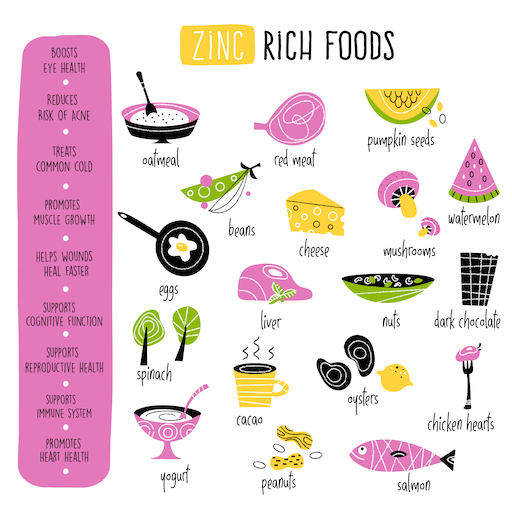
Abstract: Zinc deficiency is common, particularly during pregnancy, and this essential trace mineral is gravely important. It is significant in brain function and immune health. It is also essential for proper growth and development at all human stages, particularly in fetal development. Many adverse pregnancy outcomes can be diminished through adequate zinc intake during pregnancy. Since zinc food sources are animal-based food products, pregnant women on a vegetarian diet need to be particularly aware of their zinc intake. General zinc supplementation is not recommended, but during pregnancy and particularly for those at risk of a deficiency, including zinc as part of your prenatal vitamin is a good idea.
What is Zinc?
Zinc is an essential trace element for all, as body growth and development strictly depend on zinc. Zinc supports normal growth and development during pregnancy, childhood, and adolescence. This mineral is highly influential on multiple systems in the body, including the nervous, reproductive, and immune systems.
Zinc is involved in numerous aspects of cellular metabolism. It supports the reactions of over 100 enzymes, contributes to protein synthesis, and aids in cell division. It has a profound effect on brain anatomy and neurotransmitter function. It also is a major contributor to the formation of DNA. Zinc supports skin health. And if you are missing your sense of taste and smell? Low zinc could be contributing to that.
Immune Health
Zinc is known to play a central role in the immune system. Without enough zinc, the susceptibility to various pathogens increases. There are four main ways that zinc has a profound influence on keeping us healthy and happy.
- Diet composition, age, and disease state all directly influence the amount of zinc the body reabsorbs and should consume in the diet. Zinc is needed in higher amounts in those that are older and/or have a disease to help heal and run the body effectively. It also plays a role in wound healing.
- Zinc is a cofactor to over 100 enzymes influencing various organ functions that negatively affect the immune system.
- Zinc directly impacts the production, maturation, and function of leucocytes, white blood cells that are involved in protecting the body against infectious disease and foreign invaders. It is also crucial for the regular operation of neutrophils, natural killer cells, and macrophages.
- Zinc influences the function of immunostimulants, other drugs, and nutrients that help stimulate the immune system. Zinc has a synergistic impact, working collectively with other immune health aids.
Zinc's vast influence on immunity is rooted in its myriad of roles within basic cellular functions, such as DNA replication, RNA transcription, cell division, and cell activation. Zinc also functions as an antioxidant and can stabilize cell membranes.
Why Is Zinc Important During Pregnancy?
Zinc plays an important role in fetal development. Your baby needs zinc for its rapidly dividing cells and protein and DNA synthesis. Mild maternal zinc depletion was strongly associated with intrauterine growth retardation. Adequate zinc prevents fetal reduced brain mass in the cerebellum, limbic system, and cerebral cortex. Additionally, it has been estimated that eradicating the three most common micronutrient deficiencies (iron, zinc, and iodine) would shift the world's IQ by 10 points to the positive.
Zinc deficiency is dangerous in pregnancy as it is linked to many birth complications, including higher odds of miscarriage, preterm birth, placental inflammation, neural tube defects, and low birthweight. One study indicates that suboptimal zinc not only impacts zinc levels during pregnancy and early postnatal life. It can also affect the long-term health of the offspring, predisposing them to an increased risk of chronic disease. These health impacts can, unfortunately, carry over for generations.
Who Is At Risk For Deficiency?
A study completed in 2003 on behalf of the Maternal Zinc Supplementation Group estimated that about 82% of all pregnant women worldwide are likely to suffer from zinc deficiency. Although severe zinc deficiencies in the United States are rare, the World Health Organization also estimated that more than 80% of pregnant women worldwide are not consuming enough zinc. That is a significant amount! Even without symptoms of zinc deficiency, many pregnant women are not getting enough zinc. The growing fetus demands a substantial amount of the mineral and can deplete maternal stores, making pregnant women more susceptible to deficiency.
If you were a heavy drinker before pregnancy, have a gastrointestinal disorder, or are a vegetarian, your zinc status might be further compromised. Heavy drinkers have low zinc status because ethanol consumption decreases intestinal absorption of zinc and increases urinary zinc excretion. Individuals with ulcerative colitis, Crohn's disease, or short bowel syndrome are also more susceptible to a zinc deficiency. And lastly, that vegetarian diet will really get you in terms of increasing your zinc deficiency risk.
Vegetarian Diet
Plant-based diets contribute to zinc deficiency in two main ways: low intake, because meat and specifically shellfish are the richest sources of the micronutrient, and secondly, fiber and phytates prevalent in plant foods inhibit the absorption of zinc.
Vegetarian diets are low in zinc. Over half of the zinc in an average American diet is obtained from animal foods (25% from beef alone). Animal protein is high in zinc and highly bioavailable, enhancing zinc absorption. Much like iron, plant foods that are high in zinc, such as legumes, whole grains, nuts, and seeds, are also high in inhibitors of zinc absorption, including phytic acid.
Vegetarians should consume 50% more of the RDA for zinc than non-vegetarians. There are also specific food preparation techniques that reduce the binding of zinc by phytates and increase its bioavailability: soaking beans, grains, and seeds before cooking can also increase absorption. Leavened grains (bread) also contain more zinc than unleavened grains (crackers).
What Form of Supplementation Is Best?
Dietary sources of zinc are best. Research on supplementation has not conclusively concluded that supplementation helps alleviate associated adverse pregnancy outcomes despite high pregnancy deficiency numbers. However, consistent ingestion of zinc supplements up to the tolerable upper intake level (40 mg/day) is considered safe, even during pregnancy.
Supplements contain several forms of zinc, including zinc gluconate, zinc sulfate, and zinc acetate. Research is limited on whether differences exist among various states of zinc in absorption, bioavailability, or tolerability.
Additionally, common pregnancy supplements iron and folate influence zinc bioavailability. Balanced multivitamins or prenatals are preferred since supplementing with just iron, for example, can further a zinc deficiency.
How Much Zinc Do I Need During Pregnancy?
The official RDA recommendation for zinc increases during pregnancy from 8 mg/day to 11 mg/day due to an increased need.
To correct a mild to moderate deficiency, zinc supplementation at two to three times the RDA is necessary. Moderate to severe zinc deficiency should be treated with four to five times the RDA.
Am I Getting Zinc From Food?

Dietary zinc is the preferred zinc source as zinc can be found in many different foods, mainly animal-based foods and shellfish. Oysters contain more zinc per serving than any other food, but red meat and poultry provide the majority of zinc in the American diet. Good sources of zinc include lamb, ground beef, turkey, king crab, lobster, oysters, tofu, breakfast cereals, pumpkin seeds, garbanzo beans, kidney beans, wheat germ, whole grains, yogurt, milk, almonds, and collard greens.
-
-
- 3 ounces of oysters 74 mg of zinc
- 3 ounces of king crab 6.5 mg of zinc
- 1 cup of baked beans 5.8 mg of zinc
- 1 ounce of cashews 1.6 mg of zinc
-
To encourage optimal absorption, soaking, sprouting, and fermenting grains and legumes before consuming them decreases phytic acid content and enhances mineral absorption in the body. Consuming foods alongside acidic or high vitamin C ingredients like vinegar or lemon juice and separate from high calcium foods, like dairy, and high tannin foods like coffee and tea further the absorption of both iron and zinc.
How Can I Tell If I Am Getting Enough Zinc?
Unfortunately, zinc nutritional status is difficult to measure adequately using laboratory tests due to its distribution throughout the body. Plasma or serum zinc levels are most commonly used to evaluate zinc deficiency, but these levels do not necessarily reflect cellular zinc status. Clinical effects of zinc deficiency can be present without abnormal laboratory results. Multiple factors are considered to determine if a zinc deficiency exists; those include inadequate caloric intake, alcoholism, digestive diseases, and symptoms of zinc deficiency. Symptoms of zinc deficiency can show as impaired growth, loss of appetite, and impaired immune function.
What Do I Need to Know About Zinc Toxicity?
On the reverse side, zinc toxicity can occur from too much zinc intake. Side effects from high amounts of zinc include nausea, vomiting, loss of appetite, abdominal cramps, diarrhea, and headaches. However, all toxicities are associated with supplemental rather than dietary zinc intakes. Intakes of 150-450 mg of extra zinc per day are associated with chronic effects such as low copper status, altered iron function, reduced immune function, and reduced levels of high-density lipoproteins.
The Tolerable Upper Limit for pregnant women is established at 40 mg/day.
Prenatal Vitamin Brands: What's the Zinc Amount and Type in Popular Prenatal Brands?
| Name of the Prenatal | Amount | Type |
| Parsley Health Prenatal: | 20 mg | (zinc bisglycinate chelate) |
| Modern Fertility Prenatal: | 11 mg | (zinc bisglycinate chelate) |
| Ritual Prenatal: | None | N/A |
| FullWell Prenatal: | 20 mg | (zinc glycinate) |
| Perelel: Conception Support and All Trimester Pack: | 25 mg | (zinc bisglycinate chelate) |
| NatureMade Prenatal Multi + DHA: | 11 mg | (zinc oxide) |
| Seeking Health:Optimal Prenatal: | 20 mg | (zinc bisglycinate chelate) |
| Designs for Health: Prenatal Pro: | 13 mg | (zinc bisglycinate chelate) |
Prenatal Analysis:
Zinc bis-glycinate is the most popular supplemental form included in the multivitamins above. The consistency among the brands is a good sign that it is a bioavailable form, and any available research is being used to support the use of that form. A small randomized controlled trial shows that zinc bisglycinate has slightly better absorption than the alternative form tested, zinc picolinate. The amounts included in these formulations are either at the pregnancy RDA or slightly above to account for any deficiencies or difficulties with absorption. All amounts utilized are significantly below the established tolerable upper limit.
Resources:
- Avena NM, Fear G. What to Eat When You’re Pregnant: A Week-by-Week Guide to Support Your Health and Your Baby’s Development during Pregnancy. First edition. Ten Speed Press; 2015.
- Nichols L. Real Food for Pregnancy: The Science and Wisdom of Optimal Prenatal Nutrition. First edition. Lily Nichols; 2018.
- National Institutes of Health - Office of Dietary Supplements. Zinc - Health Professional Fact Sheet. Published online December 7, 2021. https://ods.od.nih.gov/factsheets/Zinc-HealthProfessional/
- Georgieff MK, Ramel SE, Cusick SE. Nutritional Influences on Brain Development. Acta Paediatr Oslo Nor 1992. 2018;107(8):1310-1321. doi:10.1111/apa.14287
- Simmer K, Thompson RP. Zinc in the fetus and newborn. Acta Paediatr Scand Suppl. 1985;319:158-163. doi:10.1111/j.1651-2227.1985.tb10126.x
- Favier A, Favier M. [Effects of zinc deficiency in pregnancy on the mother and the newborn infant]. Rev Fr Gynecol Obstet. 1990;85(1):13-27.
- Shankar AH, Prasad AS. Zinc and immune function: the biological basis of altered resistance to infection. Am J Clin Nutr. 1998;68(2 Suppl):447S-463S. doi:10.1093/ajcn/68.2.447S
- Rink L, Gabriel P. Zinc and the immune system. Proc Nutr Soc. 2000;59(4):541-552. doi:10.1017/s0029665100000781
- Kumari D, Garg S, Bhawrani P. Zinc homeostasis in immunity and its association with preterm births. Scand J Immunol. 2022;95(4):e13142. doi:10.1111/sji.13142